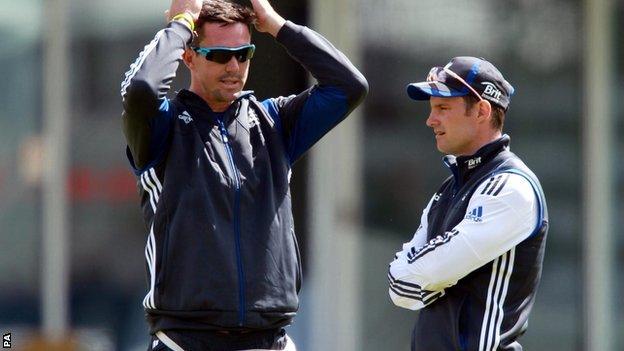Kevin Pietersen apologises for 'provocative texts'
- Published

Kevin Pietersen has issued a public apology after admitting sending "provocative texts to my close friends in the South Africa team".
He was dropped for England's third Test against South Africa over the messages.
Pietersen said: "I truly didn't mean to cause upset or tension, particularly with important games at stake."
Rebuilding trust with Pietersen will take a long time - Andrew Strauss
But England managing director Hugh Morris said further talks were needed to see if trust and mutual respect could be regained.
Pietersen, who has cast doubt on his own England future and revealed he had points to "sort out in the dressing room", said in his apology: "The texts were meant as banter between close friends. I need to rein myself in sometimes.
"I did send what you might call provocative texts to my close friends in the SA team.
"I apologise to Straussy [captain Andrew Strauss] and the team for the inappropriate remarks at the press conference and for the texts."
Pietersen's omission from the England squad for the final Test at Lord's came at the end of a turbulent week in which he first hinted he could retire completely from international cricket. Then on Saturday he committed to playing for England in all forms of the game.
However, the ECB wanted assurances by Sunday afternoon from the 32-year-old batsman that he had not sent derogatory texts about captain Andrew Strauss.
Pietersen did not do so by the deadline and was then dropped from the squad to face the Proteas at Lord's.
Morris said a "successful conclusion to the process was in everyone's best interests".
Smith - Pietersen situation 'disappointing'
However, he added: "Further discussions need to take place to establish whether it is possible to regain the trust and mutual respect required to ensure all parties are able to focus on playing cricket and to maintain the unity of purpose that has served us so well in recent years.
"Critically, those discussions should take place behind closed doors, rather than in the media spotlight."
It is unclear whether the tensions can be resolved by Saturday when England's 15-man squad for the World Twenty20 in Sri Lanka must be confirmed.
Pietersen, who has 1,176 Twenty20 runs and was player of the tournament when England lifted the trophy in 2010, was not included in the original 30-man party after quitting limited-overs internationals in May. However, he can still be called up to the final squad.
Strauss said it would have been "untenable" to have Pietersen in the squad to face South Africa.
"He is a world-class player and no-one will deny that," he said. "When he is playing well and happy in dressing room he is a great asset, but that's not where we are at the moment. The selectors made a brave and correct decision.
"I'd prefer the issues were resolved in private without media and PR companies and press releases.
"It is a broader issue than just text messages. It is about trust and mutual respect.
"It's going to be a long process, and it won't happen overnight. We have to address this issue. We can't sweep it under the carpet. It is going to be testing, no doubt about that.
"It has not been a good week for England cricket and that annoys me. I feel frustrated by that."
On Monday South Africa team manager Dr Mohammed Moosajee insisted: "Text messages were sent but it was banter."
And on Tuesday England's Twenty20 captain Stuart Broad denied any involvement in a spoof Twitter account that allegedly riled Pietersen and apparently formed part of his dispute with the ECB.
A member of the public claimed on Monday to be the author of the account, which was closed earlier this month.
Jonny Bairstow has been brought in to replace Pietersen in the England squad for the final Test against South Africa, which the home side must win to retain their number one world ranking.
And England all-rounder Tim Bresnan said on Wednesday that England "may be an even better side" without Pietersen.
"It's one of those things where a talented player is being replaced by another," said Bresnan.
"So why should we miss a certain individual because he's unavailable for selection?"
- Published14 August 2012
- Published6 August 2012